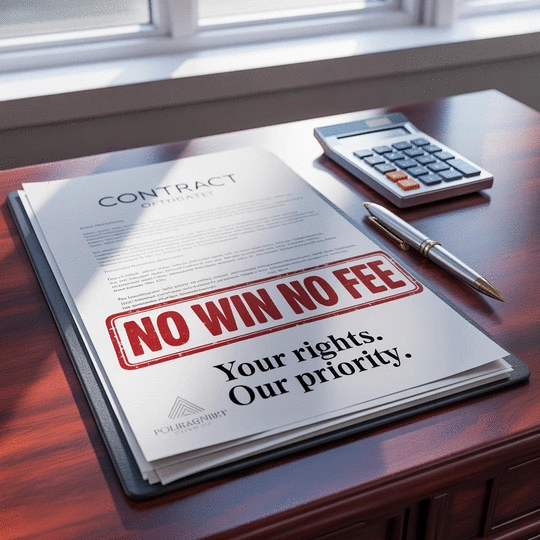Workplace Discrimination: Rights and Remedies

Posted on: 2025-09-02
By: Sarah Thompson
Understanding workplace discrimination is crucial for anyone wanting to create a fair and inclusive environment. With laws in place to protect against various forms of discrimination, being informed empowers individuals to take action. Here are the key takeaways from this essential topic.
What You Will Learn
- Discrimination can occur based on race, gender, disability, age, and religion, impacting workplace dynamics.
- The UK’s Equality Act 2010 outlines protected characteristics, ensuring individuals can work in a discrimination-free environment.
- Employees have specific rights, including the right to report discrimination without fear of retaliation and to seek accommodations for disabilities.
- The complaint resolution process involves assessment, mediation, investigation, and determination by the Equal Employment Opportunity Commission (EEOC).
- Emotional and psychological support is crucial during disputes, with resources like counseling services and support groups available for assistance.
Understanding Workplace Discrimination
The following visual summarizes key aspects and types of workplace discrimination, as well as the complaint resolution process, aiding in understanding legal rights and protections.
Types of Discrimination
- • Race
- • Gender
- • Disability
- • Age
- • Religion
Legal Protections
- • Civil Rights Act
- • ADA
- • Title VII
- • Equality Act 2010
Complaint Resolution Process
- Initial Assessment
- Mediation
- Investigation
- Determination
Key Employee Rights
- • Report discrimination
- • File complaints
- • Reasonable accommodations
- • Equal pay
Understanding Workplace Discrimination: Your Legal Rights and Protections
Have you ever felt treated unfairly at work due to your race, gender, or disability? You're not alone. Workplace discrimination can take many forms, and understanding your legal rights is crucial. Laws exist to protect individuals from these injustices, and knowing what constitutes discrimination is the first step in asserting your rights.

Workplace discrimination can manifest in various ways, including:
- Race - Discrimination based on an individual's race or ethnicity.
- Gender - Unequal treatment because of one's gender or gender identity.
- Disability - Discrimination against those with physical or mental disabilities.
- Age - Unfair treatment due to an employee's age, particularly over 40.
- Religion - Bias against individuals because of their religious beliefs.
In the UK, laws such as the Equality Act 2010 protect individuals from discrimination in the workplace. This legislation outlines protected characteristics, ensuring that everyone has the right to work in an environment free from discrimination. Being aware of these protections can empower you to take action if you ever find yourself in such a situation. For more insights into resolving workplace issues, consider learning about understanding UK workplace disputes.
Defining Workplace Discrimination: Types and Protections
Understanding the various forms of workplace discrimination is essential for identifying and addressing these issues. The protected classes under the law include age, disability, gender reassignment, marriage and civil partnership, pregnancy and maternity, race, religion or belief, sex, and sexual orientation. Each of these categories has specific legal protections designed to prevent unfair treatment.
Recognizing your rights can pave the way for a fairer workplace. If you think you’ve been a victim of discrimination, it’s vital to know that you have options. Legislation not only defines what discrimination looks like but also serves as a foundation for pursuing justice.
The Role of Legal Protections in Employment
Legal protections against workplace discrimination are embedded in several critical laws, including:
- Civil Rights Act - Protects against employment discrimination based on race, color, religion, sex, or national origin.
- Americans with Disabilities Act (ADA) - Provides protections for individuals with disabilities, ensuring they have equal opportunities in the workplace.
- Title VII of the Civil Rights Act - Focuses on prohibiting employment discrimination and outlines the procedures for filing complaints.
- Equality Act 2010 - A comprehensive piece of legislation in the UK that consolidates and strengthens various anti-discrimination laws.
As an employee, understanding these laws is crucial. They not only protect your rights but also hold employers accountable for maintaining a fair workplace. Knowing your legal standing can greatly influence the outcome of any disputes you might encounter. For further information on resolving employment disagreements, explore resources on navigating workplace disputes in the UK.
Understanding Employee Rights and Employer Obligations
As an employee, your rights are protected under employment law, which mandates that employers create a fair and inclusive workplace. This includes adhering to discrimination policies and implementing affirmative action measures to support underrepresented groups. Employers must actively work to prevent discrimination and take appropriate action when it occurs.
Key employee rights include:
- The right to report discrimination without fear of retaliation.
- The right to file a complaint with relevant authorities.
- The right to receive reasonable accommodations for disabilities.
- The right to equal pay for equal work.
Employers have a responsibility to comply with these rights and to foster an environment that promotes respect and equality. Understanding both sides of this equation is vital for navigating workplace dynamics effectively.
Interactive Poll: Your Experience Matters!
Have you ever experienced workplace discrimination? Your insights can help raise awareness and support for others facing similar situations. Please take a moment to share your experience:
Next Steps After Filing a Complaint
What to Expect During the Resolution Process
After you’ve taken the important step of filing a workplace discrimination complaint, it’s normal to feel uncertain about what comes next. The resolution process typically unfolds in a series of stages, and understanding these can help ease some of that anxiety. First, the Equal Employment Opportunity Commission (EEOC) will notify both you and your employer of your complaint.
Next, you can expect a timeline that includes:
- Initial Assessment: The EEOC will assess if your complaint falls under their jurisdiction.
- Mediation: Often, the EEOC will offer mediation as a first step, allowing both parties to come to a resolution without further escalation.
- Investigation: If the mediation doesn’t resolve the issue, the EEOC will conduct a thorough investigation, which may involve collecting evidence and interviewing witnesses.
- Determination: Finally, the EEOC will issue a determination based on their findings, which can lead to a right-to-sue letter if they find in your favor.

Remember, internal investigations by your employer can also take place simultaneously. These are crucial as they may ultimately influence the outcome of your case and ensure that the company is held accountable. For a deeper dive into financial considerations for legal action, you might want to look into understanding no-win, no-fee disputes.
Emotional and Psychological Support During Disputes
Facing workplace discrimination is not just a legal battle; it can take a significant toll on your emotional well-being. Many individuals experience feelings of stress, anxiety, or even depression throughout this process. That’s why it’s essential to seek support during these challenging times.
Here are some resources that can help you cope:
- Counseling Services: Professional therapists can provide coping strategies and support tailored to your experiences.
- Support Groups: Connecting with others who have faced similar challenges can be empowering and validating.
- Employee Assistance Programs (EAP): If your employer offers an EAP, take advantage of their resources, which often include counseling and mental health support.
- Legal Aid Services: Organizations that provide legal assistance can also offer emotional support and guidance.
Remember, you are not alone in this journey. Seeking help is a sign of strength, and it can significantly improve your outlook as you navigate your rights and options.
Frequently Asked Questions About Workplace Discrimination
What are the common types of workplace discrimination?
Common types include discrimination based on race, gender, disability, age, and religion. These forms of discrimination can lead to unfair treatment in hiring, promotions, pay, and other employment aspects.
What laws protect employees from workplace discrimination in the UK?
In the UK, the primary law is the Equality Act 2010. This act consolidates and strengthens previous anti-discrimination laws, outlining protected characteristics and ensuring individuals have the right to a discrimination-free work environment.
What are my rights as an employee if I experience discrimination?
Employees have several key rights, including the right to report discrimination without fear of retaliation, the right to file a complaint with relevant authorities (like the EEOC in the US), the right to receive reasonable accommodations for disabilities, and the right to equal pay for equal work.
What is the complaint resolution process for workplace discrimination?
The typical process involves several stages: initial assessment by a body like the EEOC to determine jurisdiction, mediation to seek an amicable resolution, investigation if mediation fails, and finally, a determination based on findings. Internal investigations by the employer may also occur.
Where can I find emotional and psychological support during a discrimination dispute?
Resources include professional counseling services, support groups for those with similar experiences, Employee Assistance Programs (EAPs) offered by employers, and legal aid services that may also provide guidance and support.
Concluding Thoughts on Your Rights and Resources
Summary of Key Takeaways on Workplace Discrimination
In summary, understanding your legal rights and the complaint resolution process is crucial in navigating workplace discrimination. We’ve covered the steps to expect after filing a complaint, the importance of emotional support, and the various resources available to help you through this challenging experience. A clear understanding of these aspects can empower you to take charge of your situation.
Call to Action: Empower Yourself and Seek Help
Now is the time to take proactive steps in understanding your rights! Don’t hesitate to seek assistance when facing workplace discrimination. Whether you reach out to a legal expert, a counselor, or a support group, remember that you have resources available to you. Organizations like labor unions and compliance programs can also offer guidance and support. Empower yourself by staying informed and proactive!
Recap of Key Points
- Workplace discrimination can occur based on race, gender, disability, age, and religion.
- The Equality Act 2010 and other laws provide protections against workplace discrimination.
- Employees have the right to report discrimination without fear of retaliation and to seek reasonable accommodations.
- The complaint resolution process involves initial assessment, mediation, investigation, and determination by the EEOC.
- Emotional and psychological support resources are crucial for individuals facing discrimination.
 Did you know that many tenants are unaware of their rights regarding housing disrepair? Understandin
Did you know that many tenants are unaware of their rights regarding housing disrepair? Understandin
 In today's uncertain job market, knowing your rights when it comes to termination is more crucial th
In today's uncertain job market, knowing your rights when it comes to termination is more crucial th
 In the world of serious injury claims, navigating financial challenges can be daunting. Interim paym
In the world of serious injury claims, navigating financial challenges can be daunting. Interim paym
